Muscularis externa - Guides d'étude, Notes de cours & Résumés
Vous recherchez les meilleurs guides d'étude, notes d'étude et résumés sur Muscularis externa ? Sur cette page, vous trouverez 226 documents pour vous aider à réviser pour Muscularis externa.
Page 4 sur 226 résultats
Trier par
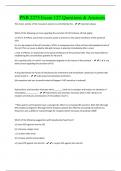
-
PNB 2275 Exam 127 Questions & Answers
- Examen • 23 pages • 2024
-
- €10,87
- + en savoir plus
The motor activity of the muscularis externa is controlled by the - myenteric plexus Which of the following are true regarding the secretion of HCl? (choose all that apply) a.) The H, K ATPase, also known as proten pump is present on the apical membrane of the parietnal cells. b.) As a by-product of the HCl secretion, HCO3- is transported out of the cell from the basolateral side of the cell. This can cause a alkaline tide (pH increase in plasma) immediately after a meal. c.) Na, K ATPases...
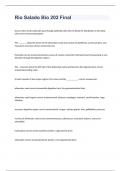
-
Rio Salado Bio 202 Final exam 2023 with 100% correct answers
- Examen • 13 pages • 2023
-
Disponible en pack
-
- €14,83
- + en savoir plus
Occurs when small molecules pass through epithelial cells into the blood for distribution to the body cells correct answersabsorption The _______ abuts the lumen of the alimentary canal and consists of epithelium, Lamina propria, and muscularis mucosae correct answersmucosa Peristalsis correct answersInvoluntary waves of muscle contraction that keep food moving along in one direction through the digestive system. The _ traverses down the left side of the abdominal cavity and becomes the...
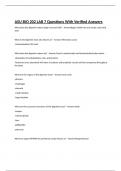
-
ASU BIO 202 LAB 7 Questions With Verified Answers
- Examen • 14 pages • 2023
-
Disponible en pack
-
- €12,36
- + en savoir plus
What does the digestive system begin and end with? - AnswerBegins within the oral cavity; ends with anus What is the digestive tract also known as? - Answer-Alimentary canal -Gastrointestinal (GI) tract What does the digestive system do? - Answer-Food is mechanically and biochemically broken down -Absorption of carbohydrates, fats, and proteins -Nutrients (once absorbed) will enter circulatory and lymphatic vessels and be transported throughout the body What are the organs of the dig...
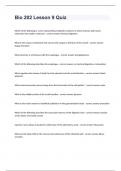
-
Bio 202 Lesson 9 Quiz well answered to pass
- Examen • 3 pages • 2024
-
Disponible en pack
-
- €9,88
- + en savoir plus
Bio 202 Lesson 9 Quiz well answered to pass Which of the following is a term representing metabolic reactions in which enzymes split macro molecules into smaller molecules - correct answer Chemical digestion What is the mucous membrane that secures the tongue to the floor of the mouth - correct answer lingual frenulum What structure is continuous with the esophagus - correct answer laryngopharynx Which of the following describes the esophagus - correct answer no chemical digestion or a...
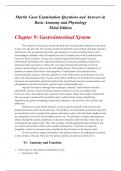
-
Chapter 9: Gastrointestinal System Martin Caon Examination Questions and Answers in Basic Anatomy and Physiology Third Edition
- Examen • 38 pages • 2023
-
Disponible en pack
-
- €7,30
- + en savoir plus
Martin Caon Examination Questions and Answers in Basic Anatomy and Physiology Third Edition Chapter 9: Gastrointestinal System 9.1 Anatomy and Function 1. Which type of cell produces hydrochloric acid? a. Zymogenic cells b. Parietal cells c. Chief cells d. Enteroendocrine cells Answer is B: The parietal cells of gastric glands produce hydrochloric acid. (Zymogenic cells are the same as chief cells, and they produce pepsinogen.) 2. What is the role of gastrin in the digestive ...
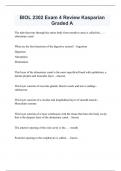
-
BIOL 2302 Exam 4 Review Kasparian Graded A
- Examen • 40 pages • 2024
-
- €13,35
- + en savoir plus
The tube that runs through the entire body from mouth to anus is called the.... - alimentary canal What are the four functions of the digestive system? - Ingestion Digestion Absorption Elimination This layer of the alimentary canal is the most superficial lined with epithelium, a lamina propria and muscular layer. - mucosa This layer consists of exocrine glands, blood vessels and nerve endings - submucosa This layer consists of a circular and longitudinal layer of smooth muscle. -...
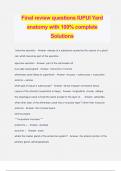
-
Final review questions IUPUI Yard anatomy with 100% complete Solutions
- Examen • 4 pages • 2024
-
Disponible en pack
-
- €10,38
- + en savoir plus
Final review questions IUPUI Yard anatomy with 100% complete Solutions holocrine secretion - Answer- release of a substance caused by the rupture of a gland cell, which becomes part of the secretion apocrine secretion - Answer- part of the cell breaks off true salty sweat gland - Answer- merocrine or eccrine alimentary canal (deep to superficial) - Answer- mucosa > submucosa > muscularis externa > serosa what type of tissue is submucosa? - Answer- dense irregular connective tis...
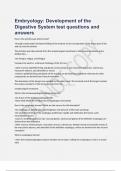
-
Embryology Development of the Digestive System test questions and answers
- Examen • 6 pages • 2024
-
- €14,34
- + en savoir plus
How is the primitive gut tube formed? -through craniocaudal and lateral folding of the embryo via the incorporation of the dorsal part of the yolk sac into the embryo The primitive gut tube extends from the oropharyngeal membrane to the cloacal membrane and is divided into... -the foregut, midgut, and hindgut Compare the adult vs. embryonic histology of the GI tract. -adult: mucosa (epithelial lining and glands, lamina propria, and muscularis mucosae), submucosa, muscularis externa,...
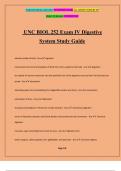
-
UNC BIOL 252 Exam IV Digestive System Study Guide
- Examen • 8 pages • 2024
-
- €9,88
- + en savoir plus
UNC BIOL 252 Exam IV Digestive System Study Guide selective intake of food - Ans:-ingestion mechanical and chemical breakdow of food into a form usable by the body - Ans:-digestion the uptake of nutrient molecules into the epithelial cells of the digestive tract and then into the blood or lymph - Ans:-absoprtion absorbing water and consolidating the indigestible reisdue into feces - Ans:-compaction elimination of feces - Ans:-defecation the physical breakdown of food into smaller particl...
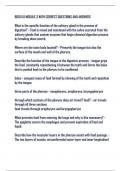
-
BIOD 151 MODULE 3 WITH CORRECT QUESTIONS AND ANSWERS
- Examen • 10 pages • 2024
-
Disponible en pack
-
- €20,67
- + en savoir plus
BIOD 151 MODULE 3 WITH CORRECT QUESTIONS AND ANSWERS What is the specific function of the salivary gland in the process of digestion? - Food is mixed and moistened with the saliva secreted from the salivary glands that contain enzymes that begin chemical digestion process by breaking down starch. Where are the taste buds located? - Primarily the tongue but also the surface of the mouth and wall of the pharynx. Describe the function of the tongue in the digestive process - tongue gri...

5,99 € pour votre résumé de manuel multiplié par 100 camarades... Faites le calcul : c'est beaucoup d'argent ! Ne soyez pas un voleur de votre propre portefeuille et commencez à télécharger le vôtre maintenant. Découvrez tout sur gagner de l'argent sur Stuvia


